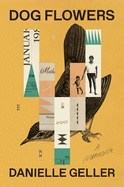
That Danielle Geller survived to write Dog Flowers seems miraculous. Her raw debut might need a content warning: abandonment, alcoholism, attempted suicide, domestic violence, parental incarcerations, family deaths--much of which is intrinsically linked to her enigmatic, missing mother. In bearing elegiac witness to aching losses, Geller finds surprising paths toward healing rewards.
Laureen "Tweety" Lee was homeless before dying alone of alcohol withdrawal at 49 in a Florida hospital. Geller, her eldest daughter, was the only family to visit; she died while Geller was on her return flight. Geller took home Laureen's suitcase filled with diaries, photos, letters, jewelry--the intimate leftovers from which Geller began to piece together her elusive parent. Born to the Tsi'naajinii of the Navajo Nation, Laureen fled at 19, married an abusive alcoholic and had two children she abandoned.
Geller was tossed between a violent father who was in and out of jail, an aging 17-years-sober grandmother and drug-addicted sister Eileen. Caught in cycles of familial manipulation as an adult, Geller moved through isolation and disappointing affairs. With Laureen's death, in confronting her troubled, truncated life, Geller gleans hard-won understanding as a daughter, a Native woman, her whole self.
Geller, who has a master's in library science, uses her archival training intriguingly to enhance her non-linear narrative, interrupting her writing with annotated photos and decades-old art, and inserting footnotes that reveal Laureen's journal entries, which often contradict Geller's memories. So many of Geller's own torments and misfortunes are inseparable from her mother's tragedy. Exposing that intertwined trauma onto the page enables Geller to begin her own recovery. --Terry Hong, Smithsonian BookDragon

